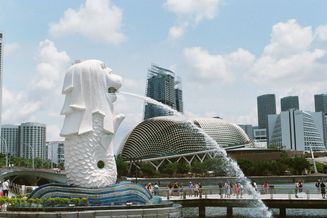Singapore Company Registration in 2025: The Complete Guide
- Modified: 26 June 2025
- 15 min read
- Starting a Company


Melissa Yeo
Author
Melissa's unique storytelling expertise makes a difference for small business owners and entrepreneurs. Her background in content and social media spans eight years in various industries, including publishing, ecommerce and marketing. At Osome, she makes everything about running a business less intimidating. From specific accounting and bookkeeping advice to insights for company growth, Melissa's articles help you to take the next step on your entrepreneurship journey.

Nisah Rahim
Reviewer
Nisah Rahim is our go-to expert reviewer for all things Corporate Secretary-related in Singapore. As the Corporate Secretary Team Lead and content reviewer, Nisah meticulously examines our blog posts to ensure we provide comprehensive information on Corporate Secretary services such as local regulatory compliance, managing board meetings, maintaining company records, and providing expert advice on corporate governance matters.
So, you want to register a company in Singapore. Smart thinking! The World Bank has listed Singapore as one of the most business-friendly countries for many years now.
But while Singapore boasts a welcoming business climate, the country's authorities strictly follow procedure. Company registration in Singapore is no different. You must complete a few essential (and compulsory) steps to get set up.
How long this takes depends on how well you prepare. So, if you are ready to make the leap, let's look at setting up in Singapore with Osome's complete guide.
The Step-by-Step Guide to Setting Up a Company in Singapore
Singapore is a fantastic place to register a company — but starting a business can be tricky. There's a strict process and a lot of paperwork involved.
We handle the entire process for you, from preparing documents to incorporating your company with Singapore’s authorities. Focus on your business while we take care of the compliance.
1 Choose the type of company that suits you
When setting up your company, you need to choose the type of company structure that best suits your needs. There are many different types, each with its own benefits. But you must consider it carefully, as it will dictate how your business entity is governed.
The Accounting and Corporate Regulatory Authority (ACRA) will also need this information before you can register your company.
1. Private Limited Companies (Pte. Ltd.)
A private limited company (Pte. Ltd.) is the most common type of company to open in Singapore. It's also the most scalable and flexible.
A Pte Ltd company has fewer than 50 shareholders, and its shares are inaccessible to the public. Shareholders can be individuals, companies, or a mixture of both.
2. Sole Proprietorships (SP)
This type of company is straightforward to register. But it carries the most risk, as its owners are personally liable for the company's constitution. This is because the owner and the business entity are legally seen as one.
The owner's personal assets are not protected from the company's liabilities. This means if your business in Singapore cannot pay its debts, creditors can go after your personal and business assets.
There are also limitations around who can open a sole proprietorship. Only Singapore citizens, permanent residents, and foreigners with a Dependent's Pass, Overseas Network & Expertise (ONE) Pass, or Letter of Consent can register a sole proprietorship business entity.
We'd always recommend seeking professional advice before setting up a sole proprietorship.
3. Limited Liability Partnerships (LLP)
An LLP combines features of companies and partnerships. It allows a registered company to operate and function as a partnership while giving it the status of a separate business entity from its partners. It's usually used by businesses such as attorneys and architects, where two or more partners want to form a practice.
The registered company can operate more like a partnership but get the same benefits as a Pte Ltd business, such as legal protection against liabilities.
Profits are taxed at partners' personal income tax rates if the limited partner is an individual. And at corporate tax rates if the limited partner is a corporate body. Plus, there needs to be a detailed agreement on how profits are divided.
2 Review and understand company registration requirements
Before registering a business in Singapore, we'd recommend taking some time to plan thoroughly.
Every limited company that opens in Singapore must register with the Accounting and Corporate Regulatory Authority (ACRA). They are the national regulator of Singapore's Companies Act. You risk a fine or even prison time if you don't register with them (and it's kinda hard to run a business from a prison cell).
Your application must also adhere to ACRA's processes. Broadly speaking, the Singapore business registration follows these steps:
Step 1
Obtain approval from ACRA (Accounting and Corporate Regulatory Authority) for both your business address and the company name. Ensure that the proposed company name meets ACRA's guidelines and that the address complies with local regulations.
Step 2
Prepare all the necessary documents required to establish a company. This includes drafting and finalising your company constitution and completing any other required forms.
Step 3
Submit your application to ACRA. Please note that this process may take some time. To help expedite the company incorporation, plan ahead by ensuring that all your documents are in order and that you have addressed any potential issues beforehand. Proper preparation can significantly reduce the risk of delays and streamline the registration process.
3 Determine the business structure and collect supporting documents
You need to determine the structure of your company. What you choose will determine how your business will be governed. The Accounting and Corporate Regulatory Authority will want this detail before you can register your business.
You also must outline how the relationship between shareholders and the limited company will be conducted.
These facts will be outlined in your Memorandum of Association and Articles of Association, which have been joined in a single document in recent years. This document is known as the Constitution. You can submit it to ACRA in this format when setting up a company. In turn, it must abide by the provisions of the Companies Act.
Most likely, the business structure you need is that of a private limited company. This is the most popular type among Singapore companies. It's the most advanced structure and the most flexible.
A Pte. Ltd. means your business is a separate legal structure. You and other members have limited liability if the company fails.
A private limited company is the most common and flexible choice in Singapore. It offers limited liability and a separate legal identity. Consider your business needs and growth plans before deciding. If unsure, consult a professional to ensure the structure aligns with your goals.
4 Ensure your desired company name is available
Your new business needs a name! Get creative or be literal.
The usual restrictions apply: it can't be identical to an existing private limited company or too similar to an established trademark (like Coca-Cola, for example). You can check your name's availability with our tool.
The final thing to be aware of is that your business name cannot be ‘undesirable'. For example, avoid religious connotations or inappropriate language.
Pay particular attention to this if you are from a Western background. Singaporean society is more conservative than what you may be used to. What's an acceptable company name in London may be unacceptable in Singapore.
Your company's name must be approved before you apply to ACRA. So, any confusion over the name will delay the process until it's resolved.
5 Sign the incorporation documents
So now that you have a company name, it's time to put pen to paper to make things official and form a company in Singapore!
ACRA requires you to provide and sign a few key documents. Namely, the particulars of your directors and company secretary and your company constitution.
Remember, these documents are all legal declarations. Take them seriously and ensure all the information is accurate.
6 Incorporate your company and open a corporate bank account
Time to get going. Once your application is accepted, ACRA will officially incorporate your business. Next up: setting up a corporate bank account.
The process is similar to incorporating a company — if you plan to trade overseas or accept foreign currency, you'll need a different bank that meets your specific needs is important.
For instance, if you plan to trade overseas or accept foreign currency, you'll need a different business bank account for your company. There are multiple choices out there. Don't settle for the most convenient or first choice.
What Is Needed To Register a Company in Singapore?
This vibrant city-state offers numerous opportunities for entrepreneurs. To kickstart your venture, it's essential to understand what's needed for Singapore business registration. This guide will walk you through the key regulatory requirements. By the end, you'll clearly understand the steps involved, helping you embark on your business journey confidently.
Shareholders
If you're eager to open a company in Singapore, it's important to understand the role of shareholders in the business registration process. You'll need at least one shareholder, while private companies can have up to 50.
The Accounting and Corporate Regulatory Authority (ACRA) mandates the inclusion of a constitution in Singapore companies, which outlines crucial details such as share capital amounts and equity distribution.
Following a specific structure for this document is highly recommended to prevent complications later. ACRA even provides a model structure on their website, which you can use as a template to streamline and expedite the registration process.
Director
Singaporean law requires your company to have at least one director to reside there. That person can be a foreign national or a Singaporean citizen. As long as the business director legally resides in Singapore, they can help you fulfil this requirement.
Of course, if you are planning to relocate to Singapore full-time legally, you can do it all yourself. Otherwise, if you don't have a resident director, you can use what's known as a nominee director.
To meet legal regulatory requirements, your company must have at least one director residing in Singapore. If you’re not relocating, you can appoint a nominee director to fulfil this role. Make sure the director is compliant with Singapore's legal residency requirements to avoid delays in your business registration process.
Initial paid-up capital
The financial barrier to entry for company formation in Singapore is low. The initial capital required is S$1. Later on, you can inject more funds into the business. But be sure to notify the authorities when this happens.
It's also legal to issue shares without first receiving money from shareholders. Just ensure these amounts are paid in. Or simply wait until you have the capital before issuing shares.
Company Secretary
Every business must appoint a company secretary residing in Singapore. The company secretary keeps your business compliant with regulations and tax filings. It's an essential aspect of successfully doing business in Singapore.
A corporate secretary is responsible for all necessary documents required by law. For example:
- Issuing company resolutions
- Managing regulatory filings
- Maintaining company books
The appointment is a legal requirement; the role is critical to your business, and companies in Singapore cannot operate without one. It requires various certifications and involves many responsibilities.
A common route for many businesses to take is to use a company secretarial service. Your secretary will track deadlines, keep documents in order, and ensure you stay compliant so that you don't have to worry about this aspect of your business.
These services are particularly useful for foreign entrepreneurs. A secretarial service will flatten the learning curve of running companies in Singapore. The corporate service providers will keep you compliant without running the admin yourself.
Local company address
To operate a business in Singapore, you need a local company address. That makes sense, right? ACRA has set requirements for what sort of business address is needed.
Your company must have a registered office address in Singapore. It cannot be a P.O. box. The purpose of this address is to receive official communications, notices from the authorities, and legal papers.
If you don't want an office space or aren't a resident in Singapore, your nominee director's address can be submitted. You can keep all your relevant documents at this address, too. This is perfectly acceptable to ACRA; you don't need a premise if you don't want one.
What Happens After Opening a Company?

Congrats on incorporating your company! Here's what happens next:
- You'll get a Certificate of Incorporation by email from ACRA, the official stamp of your company's registration and recognition from the Singapore government agencies. It includes your unique business registration number. Want a hard copy? Simply request one online from ACRA for only S$50.
- ACRA will also send your Business Profile (or "Bizfile"). Think of it as your company's ID card.
- Next, it's time to open your business bank account. We've got a handy guide on how to do this in Singapore.
- Depending on what your business does, you might need to apply for certain licenses. Get this done post-registration and pre-business kick-off.
If you expect your annual turnover to exceed S$1 million, you must register for Goods & Services Tax (GST). If you're expecting less than that, you can skip this step. Remember, GST is the same as VAT in many other countries.
Ongoing Formalities & Filing Requirements
Once you have officially incorporated your Singapore business, there are some specific annual filing requirements to be made. See here for what you need to know about annual tax filing in Singapore.
If you're not Singaporean and you want a hassle-free experience, you might want to consider hiring a qualified company secretary.. like us! We'll also ensure you know important deadlines throughout your financial year.
How To Open a Company in Singapore as a Foreigner
If you're a foreigner looking to incorporate a company in Singapore, there are three approaches to take:
Apply for an Employment Pass
The Ministry of Manpower (MOM) allows entrepreneurs to get an Employment Pass (EP) after incorporating a company. No EP yet? No worries! Visa agents like Osome can help with the application. Once approved, you're good to start working in your new company. Remember, your business in Singapore needs to be a private limited one and incorporated before the EP application.
Apply for an Entrepreneur Pass (EntrePass)
MOM also offers an EntrePass for foreign entrepreneurs with venture-backed or tech-innovative businesses, open to all nationalities. If the company is registered, it should be under six months old when applying for EntrePass. If not, you can register after getting EntrePass approval. You also need to meet MOM's innovative criteria.
Register a company without relocating to Singapore
One key requirement is to have a local resident as a company director or authorised representative. This person can manage your business in Singapore.
Feeling a bit lost with the regulations? Osome is here to guide you through the successful registration process and provide nominee director and registered office address services.
How Long Does It Take To Register a Company in Singapore?
The time it takes to register a company is remarkably swift and efficient. In most cases, you can complete the entire registration process within a matter of hours or days. Singapore's user-friendly online registration system has streamlined the procedure, allowing entrepreneurs to navigate through the necessary steps swiftly.
Factors influencing the exact duration include the type of business entity you're registering and whether all required documents are readily available. Overall, the efficiency of the Singapore company registration process is a testament to its commitment to fostering a conducive environment for businesses to thrive.
What Is The Cost of Company Registration in Singapore?
The cost of registering a company in Singapore can vary depending on several factors. Here are some key cost considerations:
- Business structure: The type of business entity you choose to register, such as a sole proprietorship, partnership, limited partnership or private limited company, will impact the registration fees.
- Government fees: Singapore imposes registration fees for different business structures. For instance, registering a private limited company could cost around S$ 315, including a business name reservation. Additional fees might apply for other services.
- Professional services: If you engage the services of a corporate service provider or a professional firm to assist with the registration process, there will be associated service fees.
- Office space: While not a direct registration cost, you may need to consider the expenses of securing office space, which can vary widely based on location and type.
- Miscellaneous costs: These could include fees for necessary licenses and permits, compliance requirements, and ongoing business expenses like accounting and auditing.
It's crucial to review the latest fee schedules and regulations with the relevant authorities or consult a professional corporate service provider to get an accurate estimate of the total cost of company registration in Singapore. Costs can change over time, so staying updated on the latest requirements and fees is essential for accurate financial planning.
Advantages of Registering a Company in Singapore

Singapore could be your perfect launchpad if you're considering setting up a business. It offers a business-friendly environment and a wealth of benefits. Registering a company in this dynamic, innovation-driven city-state comes with many benefits for you to turn your entrepreneurial dreams into reality.
Singapore is one of the world’s most popular business hubs, which motivated Osome to set up an office here. The wide appeal is due to its business-friendly regulations, like the low corporate tax rate and special incentives for start ups. Beyond finances, the stable political climate and economic and legal environments can offer entrepreneurs peace of mind.

Corporate Secretary Team Lead
Tax benefits – The Delaware of Asia
Thinking about setting up a company? Singapore's attractive tax benefits might just seal the deal. Here's the lowdown:
- Tax-exempt profits: From YA 2020, 75% of the first S$100,000 of profits for the first three years of your company's life are tax-free. Check out our quick guide to Singapore's Corporate Tax System for more details.
- Zero tax: Shareholders can enjoy 0% tax on dividends and capital gains.
- Double taxation avoidance: Singapore has agreements with over 50 countries, including global economic powerhouses, that business owners don't have to pay taxes on the same income in both Singapore and another foreign country.
- Attractive tax reductions: Incorporating a company lets you create employee benefits programs that can be classified as business expenses, reducing taxable income.
- Singapore's stable jurisdiction and robust financial infrastructure make it easy to access capital, spurring a vibrant start-up scene. In 2016, US$3.5 billion was invested in private equity and venture capital alone.
- Straightforward corporate bank account opening, especially with help from corporate service providers like Osome. Plus, local banks offer great Letters of Credit support for international trading.
Entrepreneur-friendly government policies
Singapore isn't just a hub for venture capital; it's also got a government that loves innovation and entrepreneurship. They offer a range of grants, tax incentives, and assistance schemes. You might even get labour cost subsidies if your business is in specific economic sectors.
The Productivity Solutions Grant (PSG) is a great example. It helps cut the cost of digitising your business. You could even score up to 70% off your yearly accounting fees if you're eligible. Overall, Singapore is a pretty great place for entrepreneurs.
The gateway to Asia
Singapore, fondly called 'Asia Lite' by expats, is a fantastic place to open a company. It's a vibrant international hub where East meets West, and it's rated the #1 city in Asia for quality of life.
As a key logistics hub, Singapore boasts the efficient, award-winning Changi International Airport, making regional business a breeze. With more than 400 direct flights, key markets like Indonesia, Malaysia, and the Philippines are just a hop away.
Plus, Singaporean companies have a great reputation in the region. This positive image can boost your relationships with customers, suppliers, and investors while opening doors to new business partnerships.
Easy company registration process
Starting a company in Singapore is seamless. With its minimal requirements, it's one of the easiest places globally to start a business, even bagging the #2 spot in the World Bank's Doing Business rankings.
Summary
In conclusion, successfully registering a company in Singapore involves a structured approach: securing ACRA's approval for your company's name and registered office address, meticulously preparing the necessary documentation, and submitting a well-prepared application. By carefully navigating each step and planning ahead, you can streamline the process and avoid unnecessary delays. With Singapore's efficient and supportive business environment, establishing your company here can be a smooth and rewarding experience, setting the stage for your ultimate business success.
FAQ
Can you set up a business in Singapore without registering?
You can become a sole proprietor without registering a company. Naturally, to work in Singapore as a sole proprietor, you must be a legal resident.
You cannot, however, operate as a limited company without registration. As a sole proprietor, you operate under your own name, and your liability is unlimited.
A limited company is the safer, most flexible option for foreign business owners in Singapore. This structure means you will be protected from any liabilities the company may incur.
How much does it cost to register a company in Singapore?
It can vary, but the standard company registration fee in Singapore is S$300. This is a one-off, so all-in-all it’s a fairly modest investment. The business name application fee is an additional S$ 15.
The only recurring cost is the annual tax filing costs. This will be another S$ 60 a year. These costs are, as you can see, very manageable. And it’s a big part of Singapore’s attractiveness to entrepreneurs.
How long does it take to open a Singapore company?
It depends on you and your preparation. If you are well-organised and well-versed in what’s required for company registration, getting set up is relatively painless.
Can an EP holder set up a company in Singapore?
Yes, EntrePass holders can register a company in Singapore. There is no difference between an EP holder and a Singapore citizen regarding registration. Indeed, EP holders can set up the company by themselves. They do not need a Singapore citizen to join as a director. As an EP holder, you are not restricted in any way from starting or operating a Singapore company. However, you cannot work for two companies simultaneously. In fact, any foreigner can run a Singapore business (subject to Singapore resident director requirements, see above).
More like this
Get expert tips and business insights
By clicking, you agree to our Terms & Conditions,Privacy and Data Protection Policy
We’re using cookies! What does it mean?






